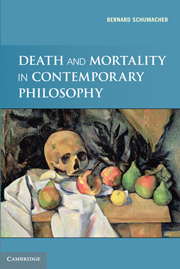Book contents
- Frontmatter
- Contents
- Preface
- Introduction
- Part One Human Personal Death
- Part Two Theory of Knowledge About Death
- 2 Scheler’s Intuitive Knowledge of Mortality
- 3 Heidegger’s Being-Towards-Death
- 4 Is Mortality the Object of Foreknowledge?
- 5 Inductive Knowledge of Death and Jean-Paul Sartre
- 6 Knowledge of Mortality Is Inseparable from the Relation to the Other
- 7 Death as the Object of Experience
- Part Three Does Death Mean Nothing To Us?
- Conclusion
- Bibliography
- Index of Names
- Index of Concepts
7 - Death as the Object of Experience
Published online by Cambridge University Press: 05 June 2012
- Frontmatter
- Contents
- Preface
- Introduction
- Part One Human Personal Death
- Part Two Theory of Knowledge About Death
- 2 Scheler’s Intuitive Knowledge of Mortality
- 3 Heidegger’s Being-Towards-Death
- 4 Is Mortality the Object of Foreknowledge?
- 5 Inductive Knowledge of Death and Jean-Paul Sartre
- 6 Knowledge of Mortality Is Inseparable from the Relation to the Other
- 7 Death as the Object of Experience
- Part Three Does Death Mean Nothing To Us?
- Conclusion
- Bibliography
- Index of Names
- Index of Concepts
Summary
In the preceding pages we have seen that the human being’s consciousness that he can and must die has its origin in the experience of the death of another human being. One might wonder whether this consciousness is accompanied by a knowledge not only of dying, but also and especially of death as such, that is, the state of the deceased human subject. Our concern here is to determine whether a phenomenology of death is possible.
It is possible to maintain in the first place that dying (someone else’s or one’s own) can, to a certain extent, form the object of experience. A human being can “attend” the process in a way as a spectator, “share the fact of someone’s dying” as well as his own agony (insofar as he is conscious). The conscious person who is dying is able to intentionalize the world and the state in which he finds himself, to experience the successive stages thereof, and to communicate his experiences to those around him by speech or signs. Once he sinks into a state of unconsciousness, such as a coma, he is no longer capable of communicating to another person his experience of dying. If he could nevertheless still experience it, this would have to happen in some other manner than through intentionality and conscious experience.
- Type
- Chapter
- Information
- Death and Mortality in Contemporary Philosophy , pp. 117 - 148Publisher: Cambridge University PressPrint publication year: 2010



